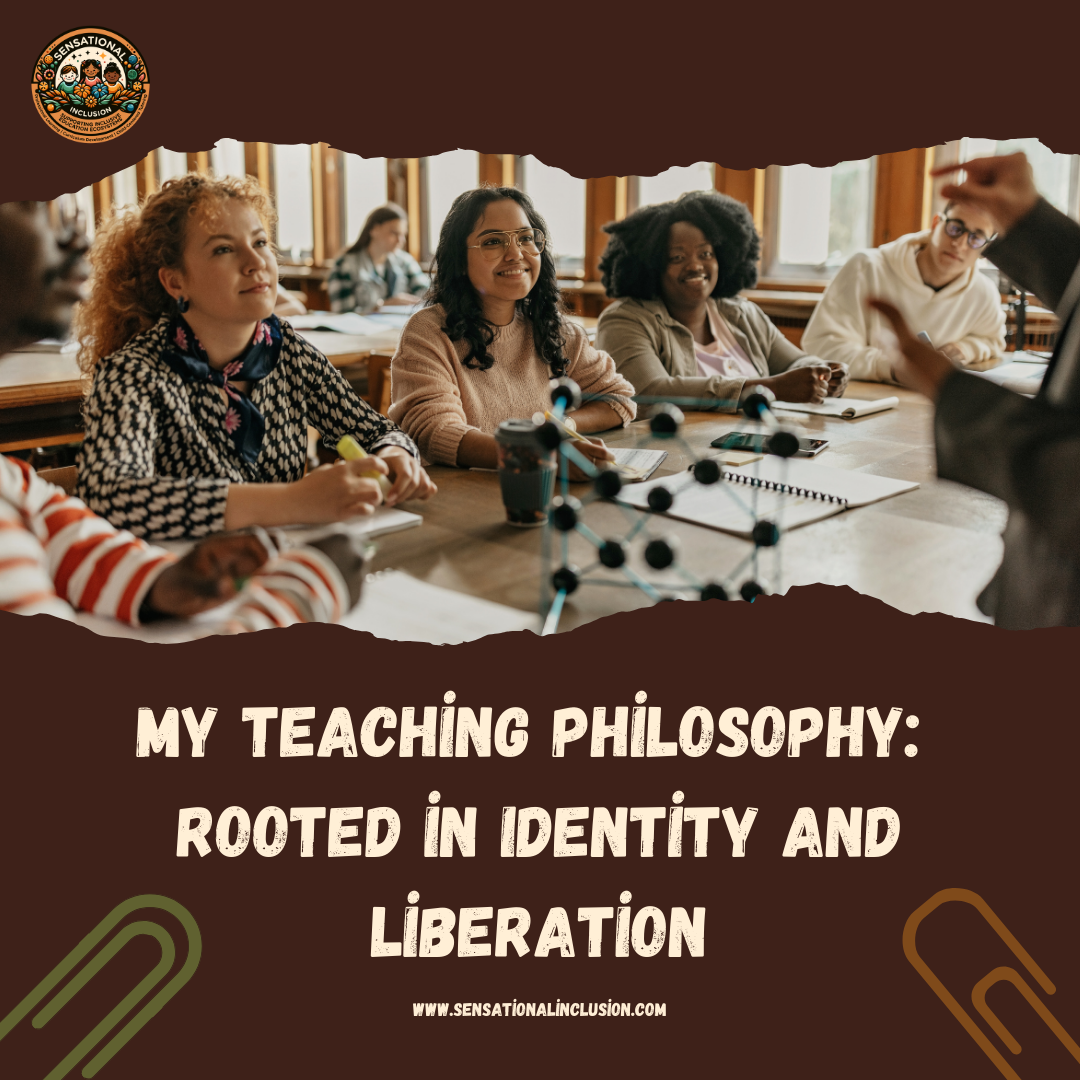As a Black Latina autistic scholar and educator, my teaching philosophy is not just a set of principles; it is a living, breathing entity shaped by decades of lived experiences. It is a commitment to honoring the profound tapestry of student identities and encounters. In this blog post, I will delve into the essence of my teaching philosophy, guided by five key commitments that are promises to myself, my ancestors, and the students I have the privilege to teach.
Fostering Critical Consciousness and Authenticity
My teaching philosophy goes beyond challenging the status quo; it’s a deliberate rejection of the shallowness often inherent in single narratives and any form of information that diminishes the humanity of a population. Informed by my lived experiences, rigorous academic training, and a distinctive way of knowing, my dedication lies in imparting counternarratives, complete truths, and complex histories. However, my vision for academic spaces transcends the traditional role of mere knowledge transfer; instead, I view them as dynamic sites of information produsage, characterized by a profound commitment to social comprehension and critical consciousness.
Unveiling Counternarratives
In my classrooms, counternarratives serve as powerful tools for dismantling entrenched stereotypes and biases. By embracing perspectives often marginalized or ignored, I empower students to question the dominant narratives and engage in a more nuanced understanding of historical events, societal structures, and cultural phenomena.
Pursuit of Complete Truths
The pursuit of complete truths demands an exploration beyond the surface, delving into the complexities that shape our world. By acknowledging the multifaceted nature of truth, students are encouraged to critically examine information, fostering a spirit of inquiry and a deeper comprehension of the interconnectedness of knowledge.
Embracing Complex Histories
History is not a linear narrative; it’s a tapestry woven with diverse threads. My approach to teaching seeks to unravel the intricate complexities of history, highlighting the voices and experiences often relegated to the margins. This emphasis on complex histories ensures that students engage with a more comprehensive and inclusive understanding of the world.
Information Produsage and Social Comprehension
Academic spaces, as information produsage centers, are not only spaces for receiving knowledge but active platforms for creating and shaping it. Here, social comprehension plays a pivotal role. It involves understanding the social contexts that shape information, acknowledging the power dynamics at play, and fostering an awareness of how knowledge production is deeply intertwined with societal structures.
Nurturing Critical Consciousness
Critical consciousness is the cornerstone of my teaching philosophy. It empowers students to question, analyze, and challenge prevailing norms and structures. By fostering critical consciousness, I aim to cultivate a generation of thinkers who are not passive consumers of information but active contributors to a more just and equitable society.
In essence, my vision for academic spaces extends beyond the transmission of facts; it’s a commitment to creating dynamic environments where social comprehension, critical consciousness, and the exploration of counternarratives, complete truths, and complex histories are woven into the fabric of learning. This approach equips students with the tools to navigate the complexities of our world, fostering a deep and transformative engagement with knowledge.
Embracing Full Authenticity
Guided by the wisdom of my ancestors, I navigate all spaces with a profound commitment to authenticity, particularly within the academic realm. I adamantly reject the notion of conforming to uniformity, recognizing that true liberation is intricately linked to embracing one’s unique identity. Just as I refuse to compromise my authenticity, I actively encourage my students to embark on their own journey of self-discovery and self-expression.
This approach not only validates the significance of their cultural identities but also allows for a more holistic and nuanced understanding of the subject matter. It goes beyond the surface-level acknowledgment of diversity, fostering an environment where students can contribute their distinct perspectives, thereby enriching the collective learning experience.
Rejecting Conventional Grading for Empowerment
As an educator committed to dismantling oppressive practices, I stand firmly against reducing students to the confines of a grade. In my classrooms, the conventional grading system is obsolete. Instead, I embrace a feedback-centered approach that not only recognizes individual growth but also empowers students to challenge established hierarchies. My aim is not to stifle their potential within the limitations of a grade but to elevate them to the peak of their intellectual prowess.
In my graduate class, EDU 498: Literacy as a Social Practice, grades are conspicuously absent. Year after year, I receive feedback from students attesting to the liberation experienced when the pressure of grades is lifted. Without the looming fear of “getting it wrong,” students find their creativity unleashed. In this grade-free environment, binaries dissolve, and feedback emerges as a vehicle for expressing love and critical care. It’s a transformative shift that allows students to thrive beyond the constraints of a numerical evaluation.
Cultivating Joy in Learning
Centered in my past mistakes, I promise to never teach from a joyless place. In my classrooms, laughter and play are as important as the gritty academic content. While the learning process may get challenging, the intentional cultivation of joy will always be present, bringing our learning community back to a place of shared happiness.
With Liberty, Justice and Accommodations for All
As a neurodivergent scholar-educator, I teach from a point of intersectionality that requires accommodations for both myself and my students. In my classrooms, students don’t need a classification, diagnosis, or an IEP to receive accommodations. To need an accommodation is simply to need one, and students are always encouraged to take what they need when they need it.
In conclusion, my teaching philosophy is not typical or easily digestible, and that’s intentional. It is a reflection of who I am and the textured way I approach my teaching practice. It is a homage to the educators who came before me and a commitment to paving the way for a more inclusive and liberating education system. In embracing the tapestry of identities, my philosophy seeks to empower students and foster a love for learning that extends far beyond the confines of a classroom.

